Digital Poster
Clinical fMRI (Non-Brain Pathologies)
ISMRM & ISMRT Annual Meeting & Exhibition • 10-15 May 2025 • Honolulu, Hawai'i

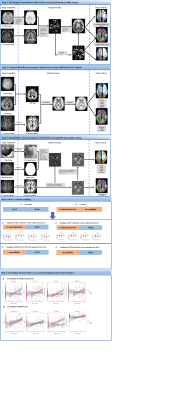 |
Computer Number: 129
2852. Cerebral
neurovascular coupling dysfunction is associated with cognitive
decline in non-dialysis patients with CKD
L. Song, W. Yang, M. Li, X. Y. Bai, B. Xu, Z. Yang, H. Wang,
Z-c Wang
Department of Radiology, Beijing Friendship Hospital, Capital Medical University, Beijing, China
Impact: Neurovascular coupling may be a key mechanism
for cognitive decline in non-dialyzed patients with chronic
kidney disease, potentially providing biomarkers for early
detection and intervention
|
|
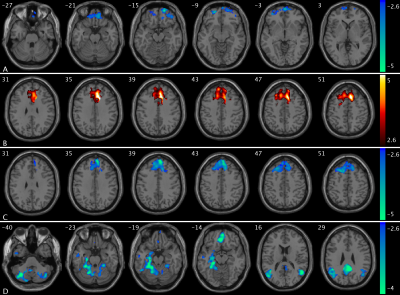 |
Computer Number: 130
2853. Abnormal
Low Frequency Fluctuations and Functional Connectivity in
Overactive Bladder Syndrome
S. Chen, Z. Zhang, Y. Zhang, K. Wengler, J. Tam, S.
Weissbart, W. Dai, X. He
State University of New York at Binghamton, Binghamton, United States
Impact: We provide new insights into the roles of FC and
ALFF in controlling urinary incontinence. This study
demonstrated that FC and ALFF may serve as potential
biomarkers for monitoring treatment effects in OAB patients.
|
|
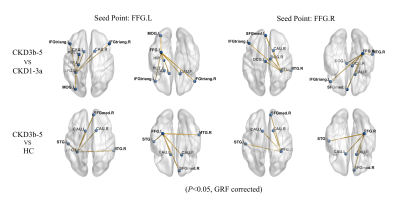 |
Computer Number: 131
2854. Cognitive
Deficits in Chronic Kidney Disease at Different Stages: The Role
of Structural and Perfusion-Driven Functional Connectivity
Changes
X. BAI, L. SONG, X. LIU, W. YANG, M. LI, B. XU, Z. YANG, Z.
WANG, H. WANG
Beijing Friendship Hospital, Capital Medical University, Beijing, China
Impact: Alterations in brain structure and perfusion may
contribute to reduced FC between the fusiform gyrus and
cognitive-related regions, offering neuroimaging evidence
for the neuropathological mechanisms of cognitive impairment
in different stages of CKD.
|
|
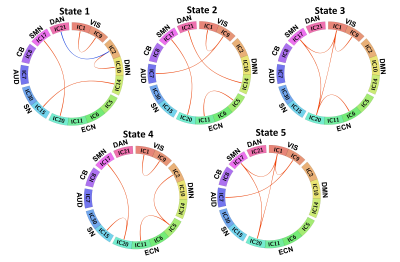 |
Computer Number: 132
2855. Altered
dynamic brain functional network connectivity related to visual
network in spinal cord injury
H. Xin, B. Yang, Y. Wang, Q. Qi, L. Wang, Y. Jia, N. Chen
Xuanwu Hospital, Capital Medical University, Beijing, China
Impact: Our results serve to increase the training
efficacy and promoting rehabilitation for SCI. This study
also suggested that the dynamic FNC analysis was a promising
avenue to deepen our understanding the pathological damage
and functional recovery mechanisms of SCI.
|
|
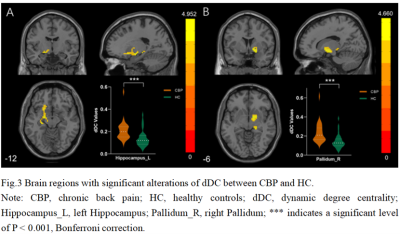 |
Computer Number: 133
2856. Exploring
Frequency-Dependent and Dynamic Changes in Brain Connectivity of
Chronic Back Pain Patients Using Degree Centrality Analysis
H. Hu, Y. Lin, L. Wang, Z. Ding
Hangzhou First People's Hospital, HangZhou, China
Impact: This study demonstrates that incorporating
frequency and dynamic analysis in addition to traditional DC
metrics can better understand the functional characteristics
of the brain in CBP.
|
|
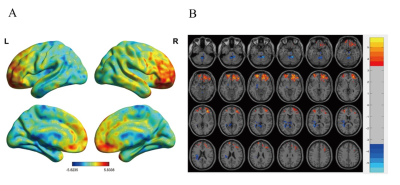 |
Computer Number: 134
2857. Amplitude
of low-frequency fluctuation (ALFF) alterations in heart
transplant patients with cognitive impairment: A resting-state
fMRI study
Q. Qin, W. Chen, J. wang, Z. Lei
Union Hospital, Tongji Medical College, Huazhong University of Science and Technology, Wuhan, China
Impact: ALFF
may serve as a potential neuroimaging marker to help
identify patients at higher risk of cognitive impairment
after heart transplantation. This would facilitate early
intervention and personalized care.
|
|
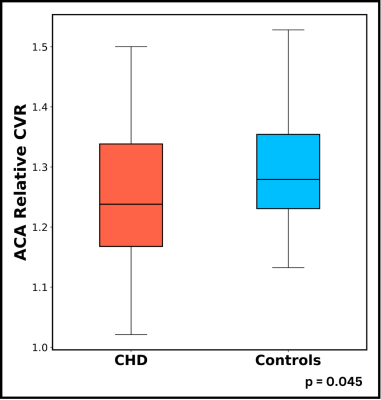 |
Computer Number: 135
2858. Resting-state
BOLD fMRI cerebrovascular reactivity in youth with congenital
heart disease
Z. Potvin-Jutras, S. Sanami, K. Easson, G. Gilbert, C.
Saint-Martin, C. Steele, M. Brossard-Racine, C. Gauthier
Concordia University, Montreal, Canada
Impact: We observed lower cerebrovascular reactivity
(CVR) in youth with congenital heart disease (CHD), with
those with single-ventricle physiology most affected,
especially in the anterior cerebral artery territory.
Females with CHD revealed poorer CVR in the middle cerebral
artery territory.
|
|
 |
Computer Number: 136
2859. Increases
in Resting State Network Connectivity in Sickle Cell Anaemia
with Spatially Constrained Independent Component Analysis
M. Lee, F. Kirkham, K. Shmueli
University College London, London, United Kingdom
Impact:
We identified increased functional connectivity within and between several large resting-state networks in sickle cell anaemia (SCA). This work may contribute to the characterisation of a signature neuroimaging profile in important disease manifestations, such as cognitive deficit and chronic pain. |
|
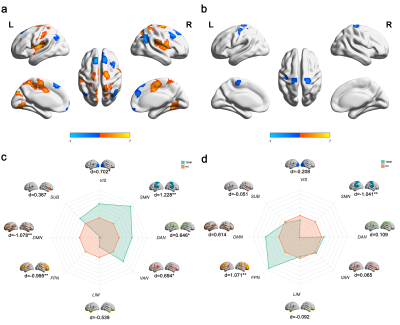 |
Computer Number: 137
2860. Systematically
altered connectome gradient in patient with Type2-diabetes
mellitus: Potential effect on cognitive function
H. Ran, t. zhang
The Affiliated Hospital of Zunyi Medical University, Zunyi, China
Impact: These findings improve our comprehension the
neurobiological mechanisms that underlie cognitive function
and offer potential imaging biomarkers for the assessment of
cognitive function in T2DM.
|
|
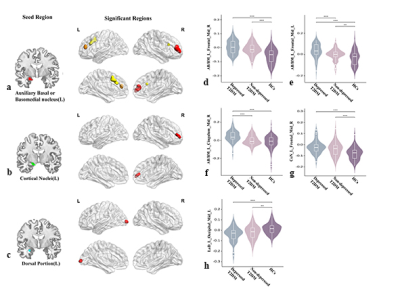 |
Computer Number: 138
2861. Altered
static and dynamic functional connectivity in amygdala
subregions in depressed type 2 diabetes patients
J. Tian, L. Zhao, G. Huang, J. Cao, C. Yang
Gansu Provincial Hospital, Lanzhou, China
Impact: This study underscores the significance of
dynamic fluctuations in comprehending depressive symptoms
associated with T2DM, thereby offering valuable insights for
clinical assessment.
|
|
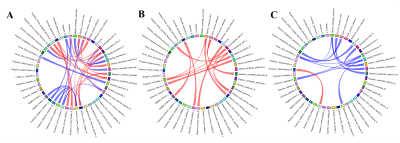 |
Computer Number: 139
2862. Altered
white matter functional networks in type 2 diabetes mellitus
with and without mild cognitive impairment
Y. Huang, D. Zhang, X. Zhang, X. Lei, X. Zhang, K. Ai
Shaanxi Provincial People's Hospital, Xi 'an, China
Impact: This study explored the change patterns of WM
functional connectome and global topological properties in
patients with T2DM under different cognitive states, which
can provide a neuroimaging basis for revealing T2DM-related
brain damage from the perspective of WM function.
|
|
|
Computer Number:
2863. WITHDRAWN |
||
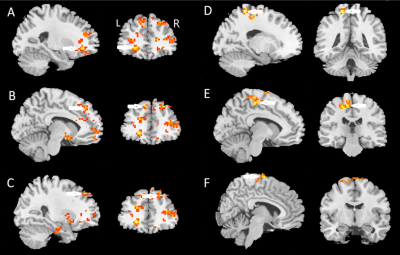 |
Computer Number: 140
2864. Assessment
of brain functional network alterations in chemotherapy-treated
breast cancer patients: A longitudinal functional MRI study
K. Khurelsukh, V. Chen, Y-H Tsai, J-C Weng
Chang Gung University, Taoyuan, Taiwan
Impact: This research impacts clinicians and breast
cancer survivors by identifying connectivity indicators for
cognitive function. It raises new questions about
personalized interventions, allowing for customized
strategies to mitigate cognitive decline and enhance the
quality of life for patients after chemotherapy.
|
|
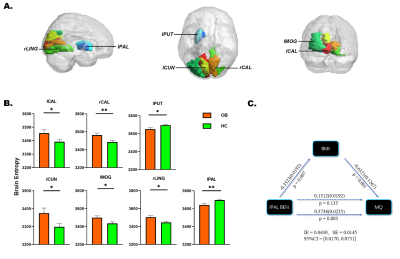 |
Computer Number: 141
2865. The
relationship between memory impairment in obese people and
altered brain entropy
K. Cheng, H. Li, D. Zhang, M. Liu, L. Wang
The Second Affiliated Hospital of Anhui Medical University, Heifei, China
Impact: Our findings underscore the neural basis of
memory impairment in obesity, providing critical insights
that may inform future interventions.
|
|
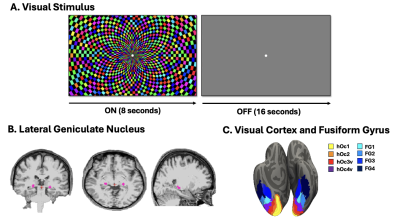 |
Computer Number: 142
2866. Differential
structural and functional impairments in cytoarchitectonic areas
of the visual pathway in glaucoma
H. S. Lee, J. W. Bang, G. Wollstein, J. Schuman, K. Chan
New York University Grossman School of Medicine, New York, New York, United States
Impact: Our
findings suggest that functional impairments are more
pronounced than structural changes in the visual pathway,
including the LGN, visual cortex, and fusiform gyrus, in
glaucoma. This highlights the importance of studying
functional impairments in higher-level visual areas in
glaucoma.
|
|
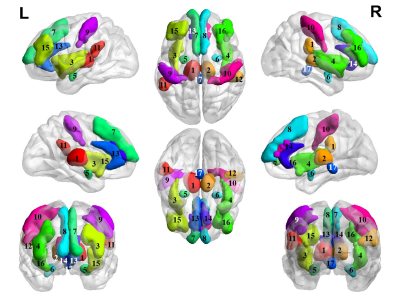 |
Computer Number: 143
2867. Changes
of pain matrix connectivity in painful diabetes peripheral
neuropathy
M. He, J. Yang, X. liu, J. Zhou, X. Zhang, j. li, X. shao,
w. li, Y. Guan, w. Zhang, f. Feng
Radiology, Beijing, China
Impact: Understanding the pain mechanism related to
function in patients with diabetes peripheral neuropathy (DPN)
is of great significance for improving the prognosis of
patients.
|
The International Society for Magnetic Resonance in Medicine is accredited by the Accreditation Council for Continuing Medical Education to provide continuing medical education for physicians.